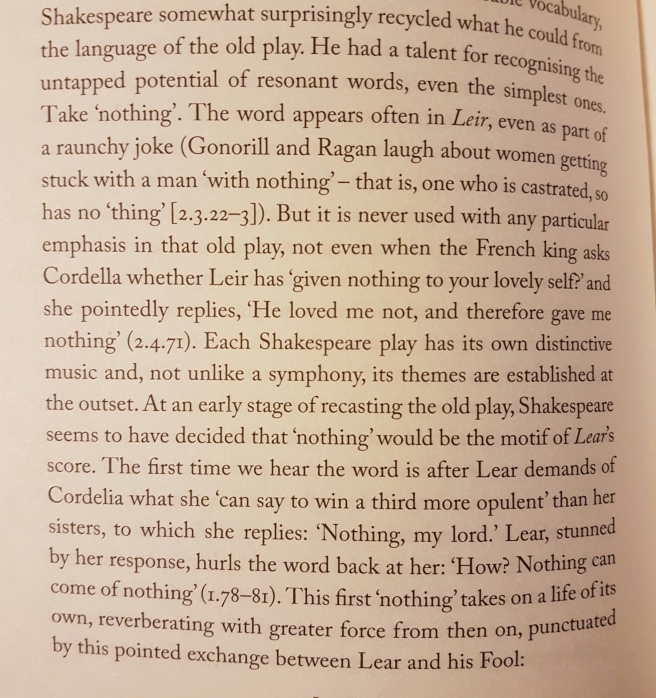Serendipity is a wonderful thing. You read a brilliant blog (@Xris32 – who else?) on memorising one word quotes in Romeo & Juliet, then later that day you’re flicking back through a book on Shakespeare and you stumble upon something significant that links back beautifully with the blog:

Shapiro’s idea, from the wonderful 1606: the Year of Lear really got me thinking. Shakespeare’s use of a single word as a motif to emphasise key themes in Lear must surely be replicated elsewhere. And if we are going to look for single word quotes to help memorisation for exams, then could we not kill two examiners with one stone and investigate the thematic and structural significance of repeated individual diction?
Today I stuck my Year 12s in a computer room. They were deeply confused: I’ve taught some of them for three years and this is probably the first time I’d taken them there. But I had a plan. A half-baked one dreamed up in the shower that morning.
The lesson went like this:
1.Gave each pupil one of the following themes from Othello
- Relationships
- Love/Hate
- Betrayal
- Jealousy
- Ethnicity
- Gender
- Perception
- Heaven/Hell
- Warfare
- Animals
- Pain/Suffering
2. Got them to copy and paste the script of each scene into a word document and perform a search of words related to the topic, using the ‘find’ tool
3. Got them to notice how it throws up results like this, helpfully highlighting the quote at the same time:

4. Pointed out that you can do this more quickly by copying and pasting the whole play in one go but stressed that doing it this way allows you to note changes throughout the play, adding structural awareness. For example, the zoomorphic language in the first half of the play is used mainly by Iago, whereas the second half of the play see Shakespeare giving Othello most of the animal imagery. It’s as if Iago has infected Othello’s vocabulary as well as poisoned his mind.
5. Asked them to start compiling statistics and comment on the really interesting ones. ‘Look’ for example appears 35 times, a pupil tells me, which supports our hunch that ideas about perception are indeed central to the play. ‘Heaven’ appears 60 times, while ‘hell’ barely features. ‘Honest’ 42 v ‘Lie’ 14?’Sweet’ and ‘love’ – in my mind more associated with R&J appears together 24 and 76 times respectively.What are we to make of that?
Well we’re still digging and researching. And figuring out the relevance of these motifs. There’s probably a quicker way but this way, I think, offers a valuable insight into the mechanics of the play in tandem with an appreciation of Shakespeare’s deliberately selective vocabulary.
And nobody got caught playing on a bloody game all lesson.
Thanks for reading,
Mark


Loved this! Does the search function work for punctuation as well? It would be interesting to map out the change in punctuation throughout Othello. Thanks for sharing.
LikeLike